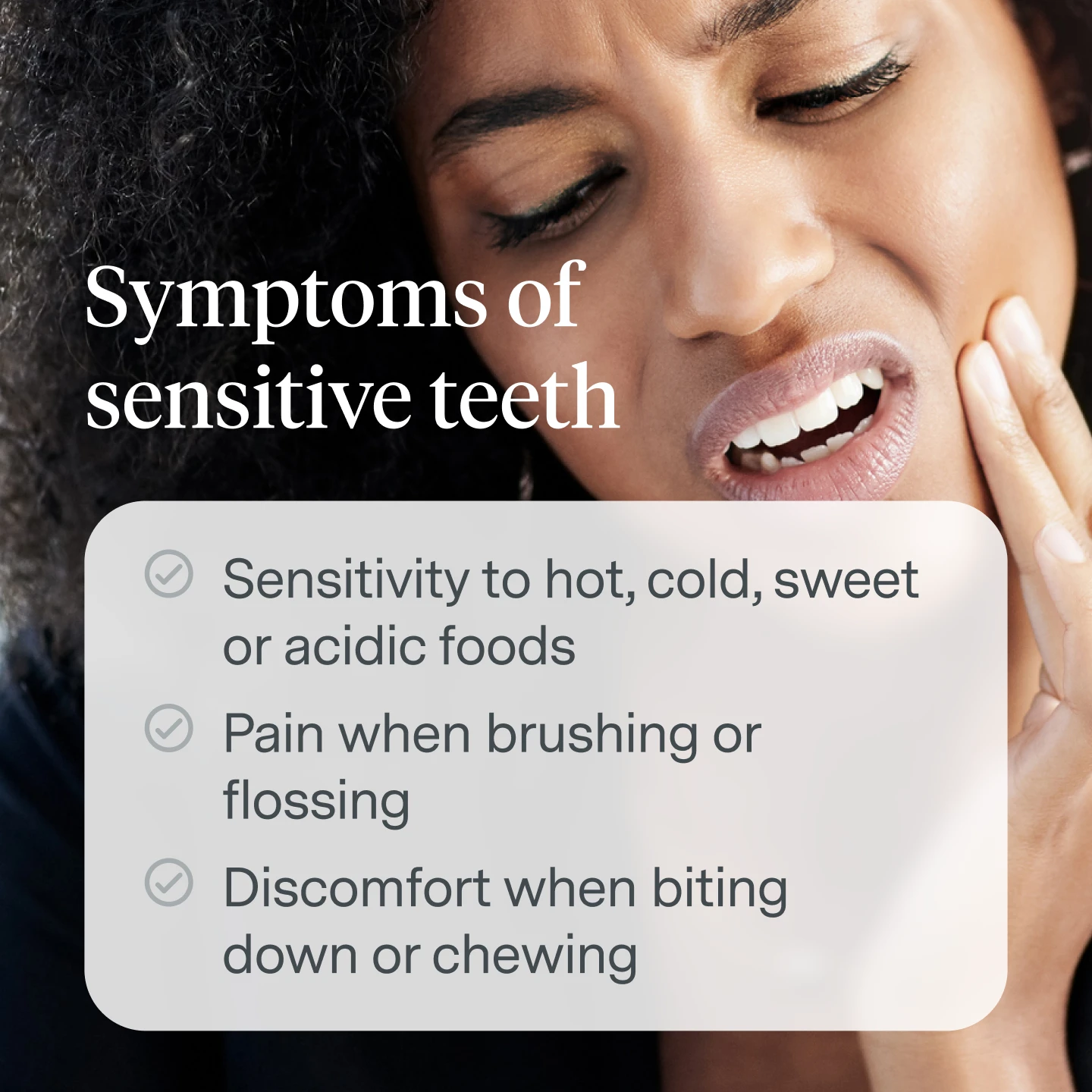Sensitive teeth
If the thought of biting into a popsicle makes you wince—you may have sensitive teeth. Sensitive teeth can cause discomfort when consuming foods and drinks that are too hot, too cold or acidic. Explore some of the causes and learn how you can manage them.
What causes sensitive teeth
Enamel erosion
Consuming acidic or sugary foods and beverages can erode your tooth enamel, exposing your teeth’s dentin and causing discomfort.
Receding gums
Receding gums expose the roots of your teeth. Your roots lack protective enamel covering, making them prone to sensitivity.
Tooth decay or cavities
Fractured or chipped teeth
Cracks in your teeth can extend to the root and irritate the nerve.
Bruxism
Grinding or clenching your teeth can wear down enamel.
Excessive plaque
Plaque buildup can lead to tooth decay and sensitivity.
Teeth whitening products
It’s possible to experience discomfort after using teeth whitening products.
Dental procedures
Your teeth may be sensitive after a professional cleaning, root planing, crown replacement, or other restoration procedures.
Periodontal disease
Gum disease (periodontal disease) can lead to tooth sensitivity.
Tooth sensitivity after fillings
Tooth sensitivity after a filling is a common occurrence due to inflammation in the nerve of the affected tooth. Thankfully, this will usually resolve on its own over time.
However, it is possible that there could be an issue with the filling, like a premature contact or high bite. If this is the case, it’s best to contact your local Aspen Dental dentist right away to have it checked out.
A sensitive touch
How to manage tooth sensitivity
✓ Avoid extremely hot or cold drinks
✓ Use desensitizing toothpaste
✓ Have your dentist adjust a filling
Still sensitive after a few weeks? Call your care team right away.
How to stop sensitive teeth pain
Click each tip below to help your smile stay happy and calm.
Toothpaste for sensitive teeth
Soft-bristled toothbrush
Fluoride applications
Avoid sugary and acidic foods and beverages
Dental procedures
Maintain oral hygiene
Sensitive teeth FAQs
Why are my teeth sensitive?
Teeth may become sensitive when the enamel on your teeth gets worn down or the gums recede, which exposes the underlying surface called dentin. This allows heat, cold, or acidic substances to come into contact with the nerves inside the tooth, causing discomfort.
Is teeth whitening safe for sensitive teeth?
Yes, teeth whitening can be safe for sensitive teeth, but it's important to choose products or treatments designed for sensitivity and to carefully follow the instructions.
How to fix sensitive teeth?
To fix sensitive teeth, it is essential to maintain good oral hygiene, use toothpaste for sensitive teeth, avoid acidic foods and foods at extreme temperatures. If you’re experiencing persistent discomfort, it may be best to consider dental treatments, like fillings or sealants, to address any underlying issues. Consult with your local Aspen Dental team for an accurate care plan tailored to your specific needs.
How to manage a tooth sensitive to cold?
We recommend using desensitizing toothpaste, avoiding extremely cold foods and drinks, maintaining good oral hygiene, and consulting your dentist for additional treatment.
Discover more for your smile
Find solutions to sensitive teeth
At Aspen Dental, our goal is to help you get back to your best smile. No need to suffer with sensitive teeth—contact your dentist for a customized care plan.

